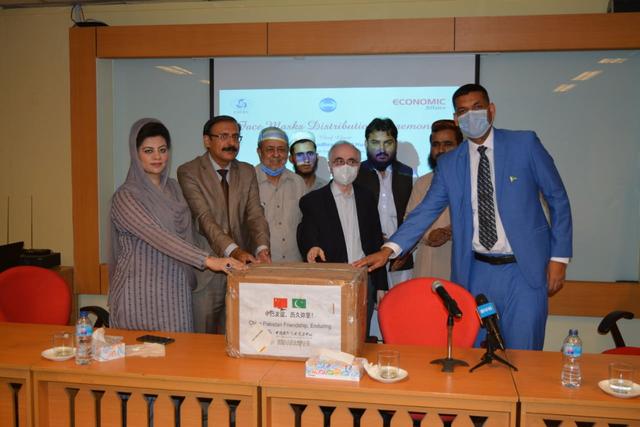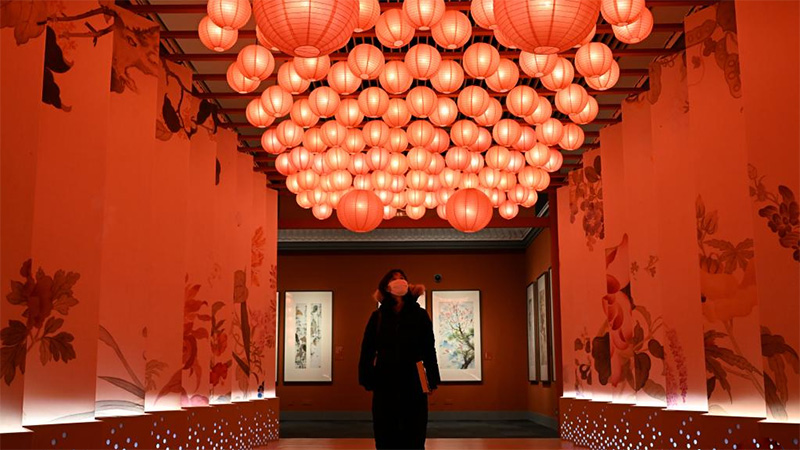Pakistani medical expert contributes to advancing China-Pakistan medical cooperation
Muhammad Shahbaz, a Pakistani who graduated from China’s Shandong University as a PhD in surgical sciences, has been living and studying in east China’s Shandong Province for 14 years.

Muhammad Shahbaz (1st from right) attending a face masks distribution ceremony. (Photo/Global People)
He always moved back and forth between China and Pakistan in the previous years to promote cooperation between medical institutions of the two countries.
The Pakistani said he is on the same wavelength with the local people in Shandong who are hospitable, unsophisticated and kind. He believes the value of life is in love and dedication, further saying that success is not about the cold, hard digits in one’s bank accounts, but about how much positive impacts one can bring to others.
Shahbaz’s connection with Shandong dates back to 2006 upon graduating from high school when his father suggested that he pursue a degree in China’s Shandong University. His father told him that China is the best friend of their country, and it was trendy at that time to go to study medical sciences in China.
After arriving at Shandong University, Shahbaz dug into the Chinese language, and just half a year later, he could communicate with others in the language.
Soon, he and his schoolmates launched a charity program in education. On weekends, they taught English to students in remote areas in Shandong, and would also donate books to the students.
Shahbaz said that through the lessons he taught, he helped the students find a way to realize their dreams, and he hopes that all of them can be admitted to renowned universities one day.
After the program ended, the students taught him to play the drums and the traditional Chinese game of Jianzi, which was described by the Pakistani as an unforgettable experience.
With the medical knowledge he learned, Shahbaz once saved a Chinese girl on a flight from Beijing to Paris. According to him, the girl was trembling and vomiting seriously at that time. Her temperature and blood pressure had also fallen to a very low level. As a result, he gave her an oxygen mask to make it easier for her to breathe and warmed her palms and forehead with bottles containing hot water wrapped in towels. He kept monitoring her temperature, blood pressure and pulse. After his professional rescue, the girl gradually recovered. The crew on the flight thanked him with warm applause. Shahbaz considers it the best day of his life, saying he’s proud of saving the life of the girl.
Since a child, Shahbaz has had a dream, which is to make a difference for those living in remote areas who cannot afford expensive medical costs.
His research supervisor Prof. Niu Jun encouraged him to keep studying, and assured him that everything will fall into place.
It was the Belt and Road Initiative (BRI) proposed by Chinese President Xi Jinping in the fall of 2013 that inspired Shahbaz, who was a postgraduate student of Shandong University then, giving him an idea to build a “health corridor” for Belt and Road countries, especially for China and Pakistan, which consists of hospitals, medical universities, research centers of traditional Chinese medicine (TCM) and Chinese herbal medicine, pharmacies, care-giving organizations and medical teams.
In his vision, the “health corridor” is connected by telemedicine, big data and artificial intelligence technologies, and shares developments in medical sciences among the Belt and Road countries.
As an active promoter of exchanges between Chinese and Pakistani medical institutions, Shahbaz also heads a Chinese-Pakistan vocational education program. Thanks to his efforts, 20 representatives from the College of Physicians and Surgeons Pakistan (CPSP) attended the inauguration ceremony for the Belt and Road International Medical Education Alliance (BRIMEA) held in China. He accompanied the Pakistani side to sign a memorandum of cooperation at Fuwai Hospital in Beijing.
The CPSP also established a training center in Jinan, capital of Shandong, and signed a memorandum of cooperation on the building of a laparoscopic surgery training center with Weifang People’s Hospital.
He led a delegation from China Medical University to visit Pakistan, and set the stage for the Chinese university and the King Edward Medical University of Pakistan to be declared as sister universities.
Besides, the Pakistani is also active at international academic conferences. In the speeches he delivered on these occasions, he often called on Belt and Road countries to launch medical cooperation.
He once received wide recognition from renowned professionals in the medical world for his thoughts on the “health corridor” concept he shared in a speech he delivered at a global meeting held at the Li Ka Shing Faculty of Medicine, the University of Hong Kong in December 2017.
At present, the “health corridor” concept proposed by Shahbaz is well under way. Many universities and organizations have established preliminary cooperative arrangements under the framework.
Formed and established at the China Medical University in Shenyang, northeast China’s Liaoning Province, with the support of Shahbaz, the BRIMEA has since seen some 49 international organizations from 25 countries join the initiative so far.
In September 2019, the Sino-Pak International Joint Lab for Drug Safety was inaugurated at Xi’an Jiaotong University, northwest China’s Shaanxi Province. In the same year, Shahbaz attended the annual conference of the Belt and Road Tropical Medical Alliance, where he made proposals for meeting the challenges facing the “health corridor.”
While promoting China-Pakistan medical exchanges and cooperation, Shahbaz has left his footprints on a number of places in China and witnessed drastic changes happening to the Chinese people, which has been a source of inspiration for his writing. He often publishes articles on Pakistani and Chinese media to share what he sees and learns in China.
After the outbreak of COVID-19 in 2020, Shahbaz, who was in Pakistan at the time, hailed China’s epidemic response in an article he published on China Daily. “China has proved that it's a responsible and dedicated nation. It's a role model for countries around the world to learn that nothing is impossible in this world,” he wrote.
Besides, he has also actively joined online meetings held by the BRIMEA and the China-Pakistan Trade Hotline Cloud Salon Joint Contribution to Health Corridor, while helping Pakistani students to participate in Belt and Road TCM online training for better TCM development in Pakistan. To date, the two countries have already kicked off formal cooperation on TCM and herbal medicine.
He introduced that nearly 20,000 Pakistani students have obtained bachelor’s degree in medical sciences in China since 2001. They are excited by China-Pakistan medical cooperation programs and look forward to more of these programs, especially those about the “health corridor.”
Shahbaz said he hopes to establish a China-Pakistan doctor alliance that can help build advanced Belt and Road hospitals in Pakistan’s impoverished regions and that are connected to the “health corridor” through the means of mobile hospitals and telemedicine.
Ahmed Farooq, Minister of the Embassy of Pakistan in China, believes that the “health corridor” would make communication and exchanges between China and Pakistan in the medical sector closer. He said it generates positive impacts and frontier viewpoints, sets an example for medical and health development in other countries and regions, and is an infinite resource that makes everything possible in the future.
Photos
Related Stories
- Pakistan assumes chairmanship of Group of 77 and China
- Pakistan to learn from China on industrialization: senate chairman
- Year 2021 demonstrates purity of friendship between China and Pakistan
- Pakistani entrepreneur expands popularity of “Made in China” products among increasingly more Pakistanis
- Pakistan-China forum held to improve business environment: Pakistani PM
- China, Pakistan issue joint declaration on win-win cooperation for common development
Copyright © 2022 People's Daily Online. All Rights Reserved.










